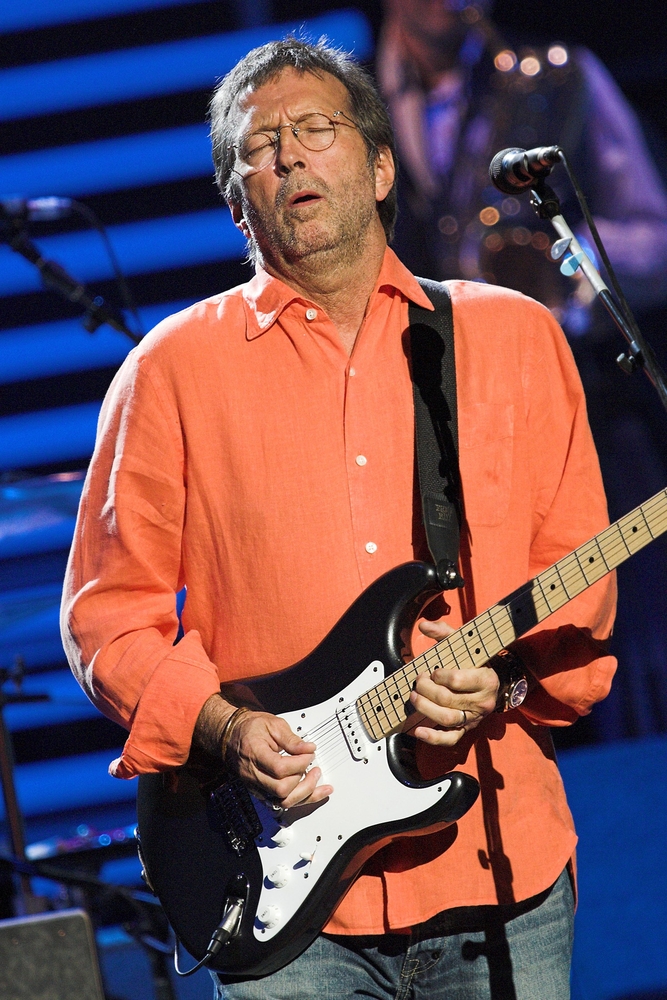“Eric Clapton is God.”
That was the button that many of us proclaimed in the late 1960s. It was scrawled on walls in the UK, and it appeared as buttons on T-shirts. A few years before that, John Lennon infamously proclaimed that the Beatles were more popular than Jesus. So, why couldn’t Eric Clapton be god?
For many of his fans, Eric Clapton was the ultimate rock guitar god. Who could come even close to him? You can brush up on Clapton’s career here, and listen to a sample here. Pull out any old Yardbirds or Cream or Blind Faith or Derek and the Dominos, or his solo work.
Clapton admits that the earlier “Clapton is God” thing had gone to his head. And, to be fair, the intervening decades have refined and softened the rock god — struggles with addictions, and the tragic accidental death of his four year old son, Conor — a loss immortalized in “Tears In Heaven.”
Eric Clapton has just turned seventy — an event that he celebrated with a concert at Madison Square Garden. According to all reports, he sounded great.
But, it was at that concert that Eric Clapton proved that he is, in fact, God.
Why this journey into Clapton-olatry?
Here’s what happened at the concert. Clapton played covers of blues songs by his own heroes, including Bo Diddley, Johnny Moore, Willie Dixon and Muddy Waters. As for his own songs — comparatively speaking, very few.
Clapton welcomed several guests — John Mayer, Jimmie Vaughan, Derek Trucks and Doyle Bramhall Jr. He let them all take solos. And yet, the birthday boy chose not to take a solo.
Here’s what the New York Times had to say about it:
For his encore at Madison Square Garden on Sunday night, Eric Clapton reconvened all four of the guitarists he had brought on as guests in the show… but there was no solo by Mr. Clapton, who stood off to one side with a Fender Stratocaster, facing the others at times like an encouraging scout leader.
Clapton held back.
Let’s leave Eric Clapton for a moment, and go to the capital city of Jewish mysticism — Safed, in the north of Israel.
Safed, in the sixteenth century, consisted of a small community of mystical seekers, most of them refugees from Spain. Many of those mystical seekers gathered around a particularly charismatic teacher, Rabbi Isaac Luria. Together, they composed the astonishing works that make up what is called Lurianic Kabbalah.
Luria (also called the ARI) was known to be a miracle worker and a healer of souls, a man who conversed with angels and communed with the spirit of the prophet Elijah.
But his greatest gift was his theory about how the world came into existence — the first original Jewish creation idea since the Torah.
The whole universe is filled with God’s presence. If that’s true, then there would have been no room for the world to exist.
And so, Luria imagined that God withdrew into the Divine Self — which is the act of tzimtzum, divine self-limitation. God had to contract in order to make room for Creation.
And then, elements of God-energy flowed out of God, drifting into divine vessels. Then, in a cosmic accident reminiscent of the Big Bang, those vessels exploded. They left traces of the God’s presence all over the universe. Whenever we do a mitzvah, it is as if we are retrieving those traces and contributing to tikkun olam, repairing the world.
God had to “shrink” in order for the world to exist. This is the Jewish mystical idea of tzimtzum, divine contraction.
When the Torah starts, and God is “young” (or, at least, younger), God is overly-active — creating, redeeming Jews from Egypt, giving laws, the whole deal. But as the Bible continues, it seems that God is less and less active and present, and has less to say, until it is almost as if God has, well, disappeared — or perhaps simply gone into eclipse.
That’s God. But it does not end with God. Just as God had to withdraw and “shrink” in order for the world to come into existence, leaders must make themselves “smaller” in order for their followers to actually do the right thing. It is true of bosses, teachers, coaches, and parents.
As the contemporary Jewish thinker Eugene B. Borowitz taught: “Take the case of a parent who has the power to insist upon a given decision and a good deal of experience upon which to base that judgment. In such an instance, the urge to compel is almost irresistible. Yet if it is a matter the parent feels the child can handle, — better, if making this decision and taking responsibility for it will help the child grow – then the mature parent withdraws and makes it possible for the child to choose.”
Perhaps that is what Eric Clapton learned. When you’re young, you grab all the solos, eager to step up and step in. And that’s how you appear to be godlike.
But now that you’re seventy, you are ready to understand that there is another way to be godlike.
You can choose to step back and let others do the creating for you.







